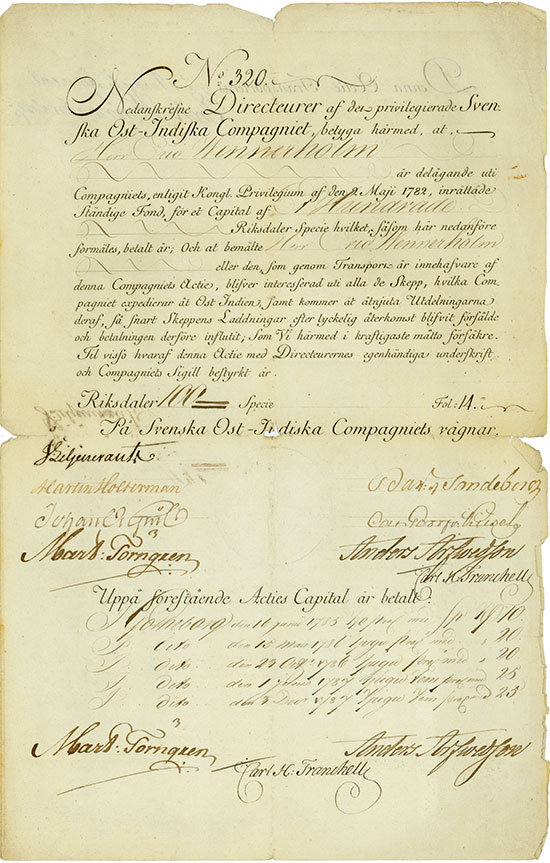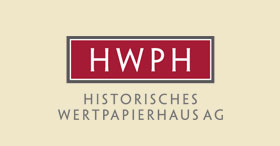Ingelsberg 17 b
D- 85604 Zorneding
Deutschland / Germany
Tel.: +49 (0)8106 - 2461-86
Fax: +49 (0)8106 - 2461-88
E-Mail: auktion@hwph.de
HWPH Historisches Wertpapierhaus AG –
Uw specialist voor historische waardepapieren
en financiële geschiedenis
|
||||
Kavelnummer |
666 | |||
Titel |
Svenska Ost-Indiska Compagniet / Schwedisch-Ostindische Compagnie | |||
Plaats(en) |
||||
Land |
Schweden | |||
Regio |
Europa | |||
Omschrijving |
02.05.1782, Aktie über 100 Reichsthaler, #320, 36,4 x 23,2 cm, schwarz, weiß, Knickfalten, DB, Knickfalten, Randeinrisse bis 3 cm, etwas gestaucht, Erhaltung VF, Druck auf Büttenpapier mit Wasserzeichen, OU von allen Direktoren, R8. | |||
Omschrijving (Engels) |
2 May 1782, Share of 100 Reichsthaler, #320, 36.4 x 23.2 cm, black, white, folds, 4 pages, folds, tears up to 3 cm, condition VF, printed on handmade papier with watermark, original signatures of all directors, R8. | |||
Toestand |
VF | |||
 |
||||
Historie (Duits) |
Das größte und bedeutendste schwedische Handelsunternehmen des 18. Jahrhunderts wurde 1731 gegründet. Zweck war der Handel nach Indien und in den Fernen Osten. Die Gesellschaft wurde neben der V. O. C. und der East India Company zu einer der größten und erfolgreichsten Ostindien-Gesellschaften. Insgesamt wurden unter der Regie der Schwedisch-Ostindischen 132 Handelsexpeditionen gestartet, von denen 128 in die Hafenstadt Kanton führten, die sich als einzige chinesische Stadt dem Handel mit Europa geöffnet hatte. Haupteinnahmequelle der Gesellschaft war der Teehandel. Die Kontinentalsperre Napoleons sowie die Seekriege des ausgehenden 18. Jahrhunderts beeinträchtigten den Überseehandel stark. Daher wurde die Gesellschaft – wie viele andere Kolonialgesellschaften auch – zu Anfang des 19. Jahrhunderts (1806) aufgelöst. | |||
Historie (Engels) |
The largest and most significant Swedish commercial enterprise of the 18th century was founded in 1731. It was the objective of this enterprise to trade to India and in the Far-East. Besides the Dutch East India Company and the East India Company, this company became one of the largest and most successful East India companies. Altogether, 132 commercial expeditions were initiated under the control of the Swedish-East India company, of which 128 led to the seaport of Kanton, which had opened the trade with Europe as the sole Chinese city. The tea trade was the main source of revenue of the company. The continental blockade of Napoleon, as well as the sea battles of the waning 18th century affected the overseas trade strongly. That is why the company – just like many other colonial companies – dissolved in the beginning of the 19th century (1806). | |||
Schenk alstublieft ook aandacht aan de topstukken van onze veiling: |
||||













